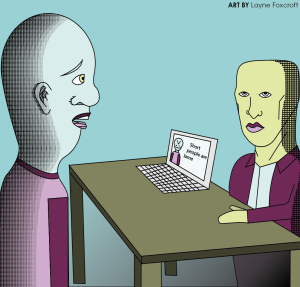Chat with Nat: Are chromebooks restrictive for the right reasons?
May 20, 2018
Walking down the halls of Bowie was a sight to see on January 12. Everywhere you looked, kids were carrying snazzy, black cases with them. Excitement buzzed around the school as students set up their new Chromebooks.
As I was walking to class, I heard someone mention how it wasn’t fair that we can’t watch Netflix on our Chromebooks. Being a Netflix enthusiast myself, my automatic internal response was to agree with the girl, but after thinking a second longer I realized that maybe it isn’t so silly to have restrictions on our “new toys.”
As high school students, we sometimes get defensive or feel entitled the second someone tells us no, but the initiative wasn’t put into place to tell us “no” to online movies, games, etc. It was put into place to tell us “yes” to newer learning opportunities.
I know, it can be more than frustrating wanting to look up a video on YouTube or trying to do research on a certain website and not being able to complete the task, but we’ve got to remember that these laptops are ours temporarily; they still belong to the district so it is up to us to abide by the district’s security software and filter policies.
The Children’s Internet Protection Act requires school districts in the United States to block specific content from students on their technology. So, while it may be us, the students, taking home the Chromebook at the end of the day, the laptop belongs to the district, and they have the federal obligation to block certain websites.
As digital citizens, we need keep in mind what we use our computers for. Our Chromebooks are educational tools and they should be used in that manner. We have countless options when it comes to what we can do with them.
Our school wouldn’t have joined the Everyone: 1 initiative if it did not have trust in our student body to be respectful online citizens.
Our society is becoming increasingly more hyper-connected, and with that comes the responsibility of digital citizenship. As we spend more and more hours online, we need to be aware not only of what we’re posting, but what websites we are visiting as well.
By blocking Netflix, Tumblr, and similar websites, AISD is aiming to protect it’s students from indecent and non-educational content. Their intentions are not to keep us from enjoying our new technology; rather, to keep our focus on building our education through certain media.
Nowadays, filtering content is a very tricky topic.
Our country may have a history of filtering the media to “protect its citizens,” but our school district blocking certain websites is another thing altogether, and shouldn’t be compared to that type of situation.
All in all, the restrictions on our devices are being upheld because they keep us, as students, focused on our education while we’re at Bowie. Anyways, the rules are rather easy to follow.
Complaining won’t get us anywhere, so instead of searching for the sites that won’t let you in, search for the sites that will benefit you.











Jonivon A • May 22, 2018 at 5:36 pm
Thanks for sharing this humbling story!